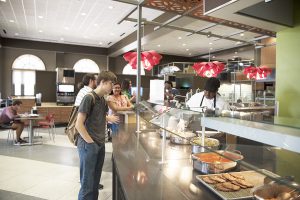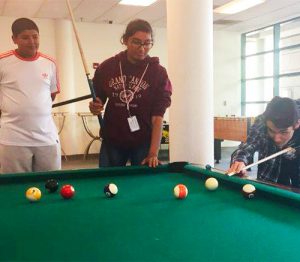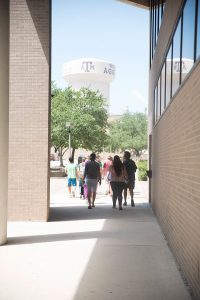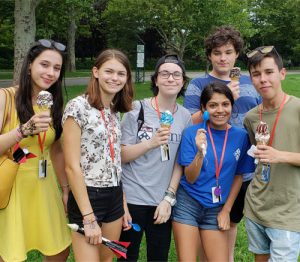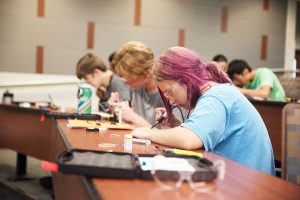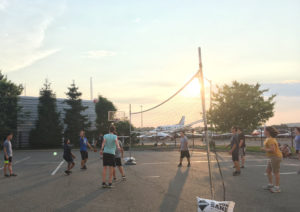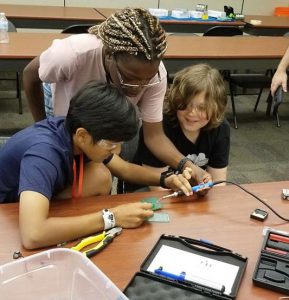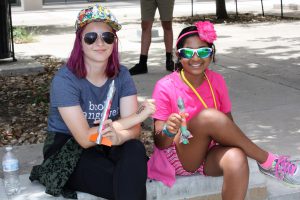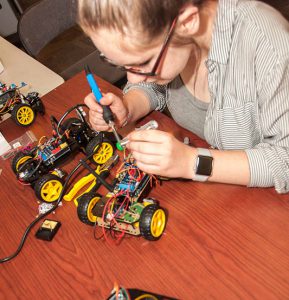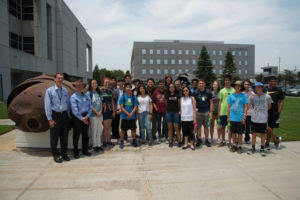The TryEngineering Summer Institute curriculum has been carefully designed to build the student experience over the two week period, with earlier activities honing skills needed in later tasks. Collectively, these activities touch on several fields of engineering, including electrical, mechanical, civil, aerospace, chemical, computer, and design think.
Coursework is project-based and hands-on. We design, engineer and build all day. We try new things, we learn new skills and the program builds upon itself. We go on an academic journey, building confidence, knowledge, experience and ability through the 5 C’s: Communication, collaboration, critical thinking, curiosity and creativity.
Below are examples of what is covered in the coursework. You can see the academic underpinnings, the design principles, the expected outcomes, and the opportunity that exists for the students to discover what is possible inside of each challenge, module, and project.
Design/build: Design Think Team Challenge (All session)
Design Thinking Challenge
Design thinking is a creative process developed at the d.school at Stanford University that helps you design meaningful solutions to problems. Student will experience the full cycle in an intro hands-on challenge and then they will step through the process of identifying a problem, developing a “how might we…” statement, defining the problem, designing a solution, and creating a prototype. Teams can choose to enter our own home-grown “shark tank” and develop a pitch for their solution.
Digital Fabrication Challenge
Light Sculpture Challenge
Students will be introduced to CAD as well as how 3D printers work. Application: Design, 3D print, assemble and test a light sculpture. Teams will create a light show applying what they learn from basic circuitry, breadboarding and microcontrollers and simulate in Tinkercad Circuits. Next they will use CAD to design the sculpture (or body) for the electronics that will enhance the light show.
- Skill Build: Intro to CAD in Tinkercad and Fusion 360 Overview.
Student will choose which package they want to use for the light sculpture challenge. Students will get an intro to Tinkercad Circuits as well so they can simulate their light show.
Electrical & Computer Engineering
Smart Car Sensor Challenge with Sensors
In this activity we’ll focus on automotive and mechanical engineering and students build from scratch a fully operative smart car and remote control. Students will work with instructors to understand the mechanical principles around steering systems. Students work in teams of three to construct and build a smart car and then edit and upload the underlying code to make functional adjustments in car operations. Build a fully operative smart car and remote control to complete an obstacle course. Explore Arduino code by modifying it to control the function of the car and add sensors to help it best navigate the obstacle course automatically. To complete this challenge, students need to learn basic circuitry and breadboarding.
- Skill Build: Basic Circuitry and Breadboarding
Student explore simple circuits through breadboard wiring of LEDs and resistors. Soldering and advanced soldering included.
- Skill Build: Intro to Micro-controllers Students will expand on prior activities which established an understanding of electrical circuitry and breadboarding to explore microcontrollers and their applications. Students will control a display and then have a choice of either developing a weather station or programming a recognizable song using passive buzzers. Students build a strong understanding of flexible coding, component integration, and problem-solving.
AM Radio Challenge with Soldering
Build a fully operational AM radio from a kit. To complete this challenge students need to learn how to solder.
- Skill Build: Soldering a functional circuit: Students set up and practice soldering, and then move on to soldering a functional circuit.
Drone Challenge with Soldering
Build a fully operational drone from scratch to carry a payload to a specific destination. The day ends with students expanding, augmenting, improving and strengthening their drones so they can participate in battles, races, and other exciting feats of engineering facing off with one another and against the clock. Imagine using the 3D printer to make a battle arm to attach to your drone (and making sure it is counter-balanced and flighworthy) then facing off against your roommate who has created a drop-tank to engage your drone!
Chemical Engineering
Berry Solar Cell Challenge
Students will create a working solar cell that mimics the process of photosynthesis and they will measure the performance of the device based on power output.
Mechanical Engineering
Hydraulic Robot Arm Challenge
Students will learn the basics of robotics and hydro-mechanical power. They will assemble a wired controlled robot arm. Students will test the arm by conducting various tasks. This activity introduces hydraulics and hydraulic machinery. Students assemble and prepare a hydraulic robot arm that controls six axes of varied movements. Students are challenged to use lever controllers to lift various items with suction mechanism as well as using gripper to transport a range of products. As a group, students simulate a construct a conveyor belt with multiple robot arms to transport multiple materials down a mock production line. Teams also compete to see which can stack the highest number of dice using only the arm.
Aerospace Engineering
Glider & Wing Design
Students will work in teams to explore aircraft and wing materials, shapes, and structures to maximize the glide slope of a glider. They will create an optimal wing design that will propel their glider the furthest distance. In this activity we will consider the principals of flight, including lift and drag, and students will design, build and test (from scratch) a glider that will carry the payload of an actual shoebox (which is fairly weighty indeed) the farthest.
Rocket Launch
In this activity we’ll focus on aerospace engineering and how space flight has been achieved from an engineering vantage point. Students will work with instructors to understand the forces acting on a rocket, Newton’s Laws, and other principles and challenges of an actual space vehicle launch. Students work individually to construct and test launch a rocket using a basic kit which they customize. Then based on their results, they will re-engineer their rocket and retest for improved accuracy and altitude. Students will build an altitude tracker and use for the competition.
Special Apollo 11 Celebration (video/speaker)
Civil Engineering
Bridge Engineering
Students will focus on civil engineering and learn various concepts for bridge design and how they handle large loads. Students will construct bridges of ever increasing complexity of materials and durable strength. These structures will hold more and more weight… what makes them work the best?
Mars Space Colony: IEEE Standardization Game
A Game of Standardization is designed to teach about technical standards and standards development while developing team and negotiation skills. Topics include the importance of standards to industry, fundamentals of standards development, and a case study on standards. Players participate as members of standards working groups, incorporating roles that reflect the economic, political and technical realities of standards development. In this activity we will explore the importance of engineering standards and work to explore challenges engineers might face in the development of a space colony on Mars.
This is a role playing exercise which surfaces the challenges of agreeing to standards.
Engineering Survey for the Future & University Applications, Essays, and Resumes
Students will take an engineering survey for the future to better understand what engineering disciplines exists, what they mean, what the majors, careers, and opportunities are and, crucially, and with which one (s) the students individually would most align. If Engineering is a possible future major and or career, this module is vital.
Students also prepare for applying to a university by exploring tips and guidelines for picking the right school, what classes to take in high school, the application process, the development of extra-curricular activities, clubs and the beginning of essays and resumes. We will explore recommendations for development practice essays, and resume guidelines for pre-university students. Students will have an opportunity to develop a preliminary resume that they can expand on over the years.
Engineering Ethics Debate
Students explore how ethics is involved in many of the engineering fields. They will consider some of the critical decisions engineers need to make when designing new products and processes.
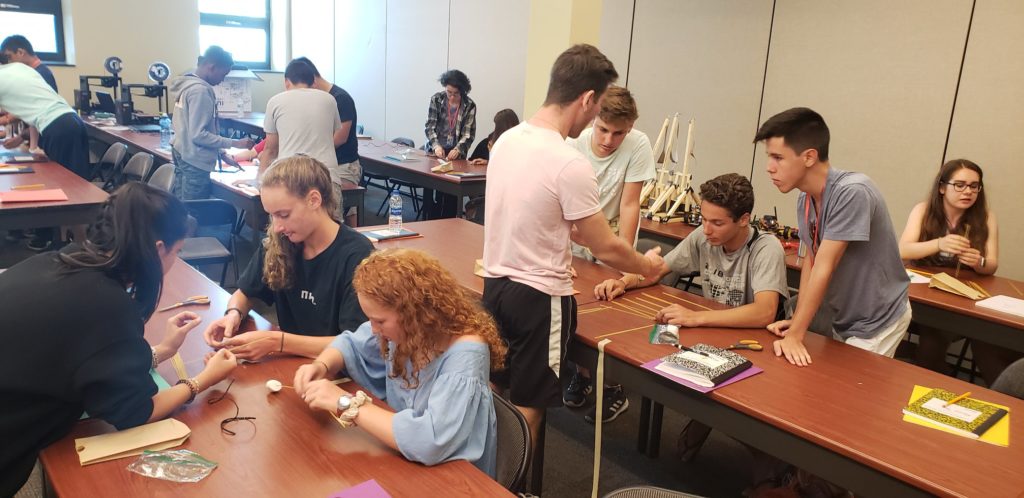
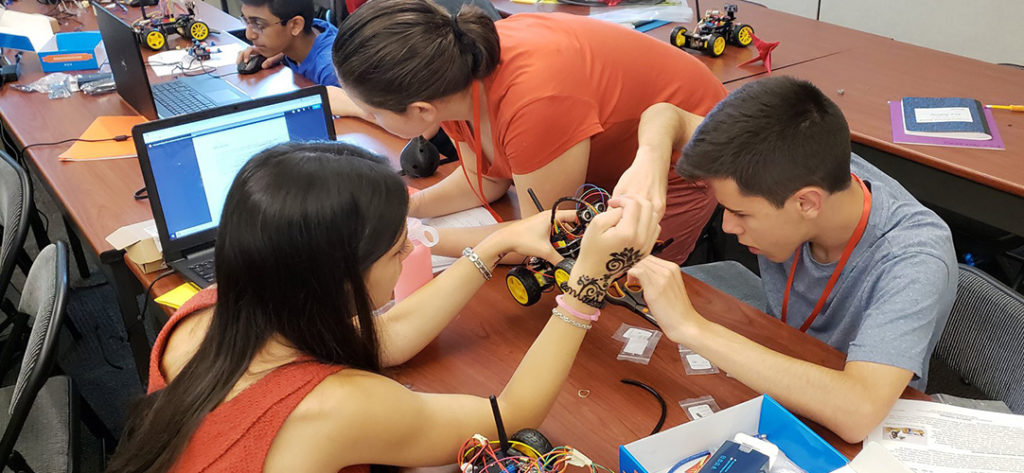
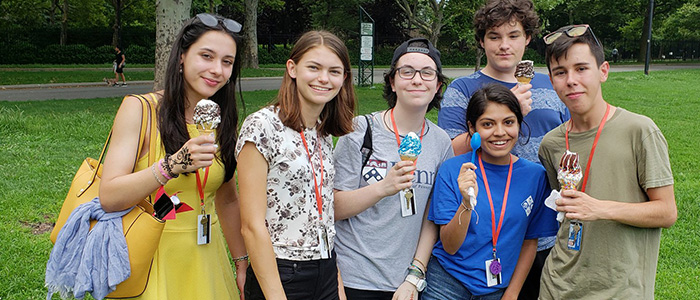

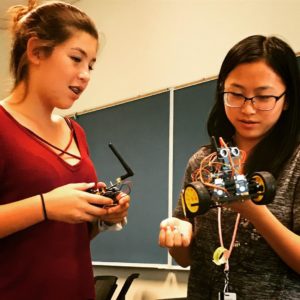
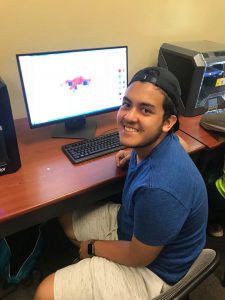 TryEngineering Summer Institute is a two-week co-ed residential summer engineering program for rising 8th through 12th grade students held at three premier colleges and universities across the United States. Students work in teams with other students, interact with professional engineers, and learn about cutting-edge research done at the host schools by current graduate students.
TryEngineering Summer Institute is a two-week co-ed residential summer engineering program for rising 8th through 12th grade students held at three premier colleges and universities across the United States. Students work in teams with other students, interact with professional engineers, and learn about cutting-edge research done at the host schools by current graduate students.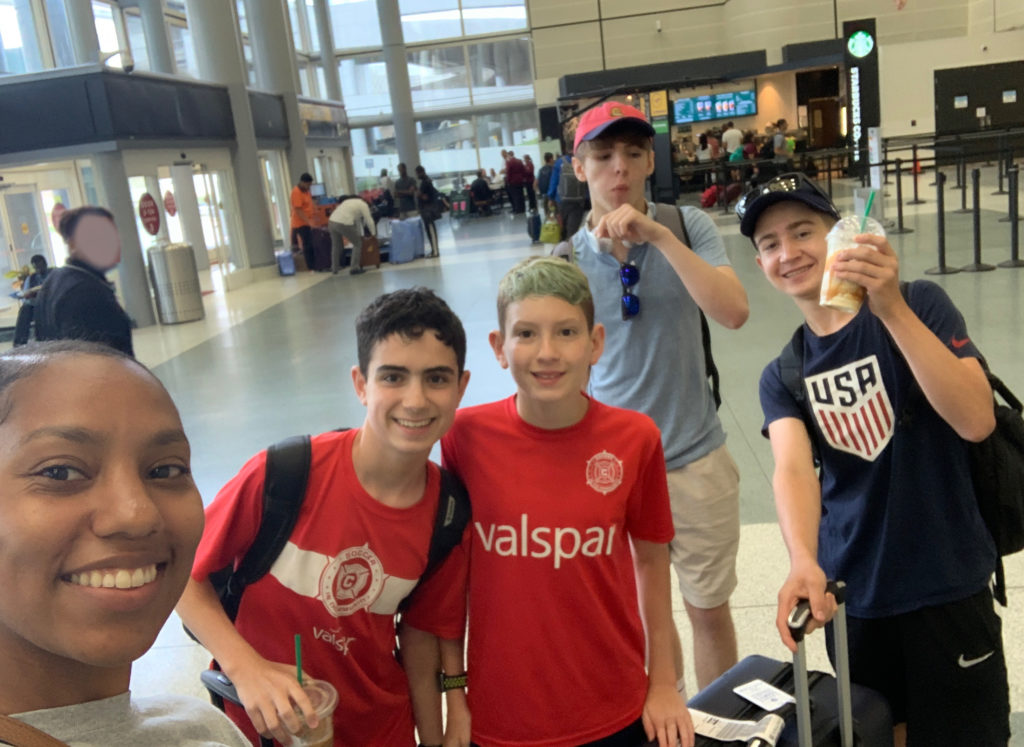

 With nonstop sunshine and the beaches, strands, shopping and more just a stone’s throw from campus, our USD TESI students will really have a wonderful summer. With such beautiful surroundings, we get the chance to explore and maybe even find the legendary fish taco truck!
With nonstop sunshine and the beaches, strands, shopping and more just a stone’s throw from campus, our USD TESI students will really have a wonderful summer. With such beautiful surroundings, we get the chance to explore and maybe even find the legendary fish taco truck! The University of Pennsylvania is a fabulous, safe urban campus located in the heart of Philadelphia. This allows us easy access to many of the local sights, sounds and flavors available to us!
The University of Pennsylvania is a fabulous, safe urban campus located in the heart of Philadelphia. This allows us easy access to many of the local sights, sounds and flavors available to us! The entrance is staffed by Penn Security 24/7. Inside is our air-conditioned wonderland, packed with the same fabulous amenities the Penn students enjoy. We also have our own outdoor area, inside the secure walls, where we have patio seating, tables, a grassy area, and more. It is quite lovely.
The entrance is staffed by Penn Security 24/7. Inside is our air-conditioned wonderland, packed with the same fabulous amenities the Penn students enjoy. We also have our own outdoor area, inside the secure walls, where we have patio seating, tables, a grassy area, and more. It is quite lovely.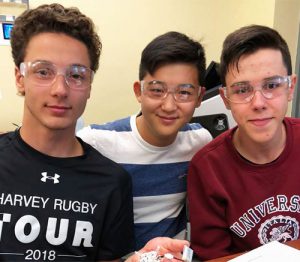
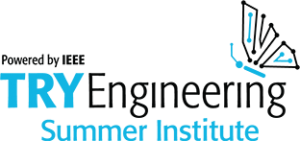


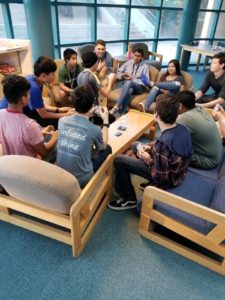
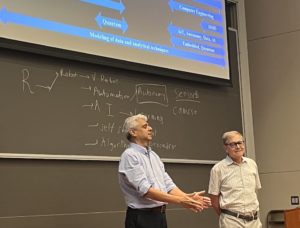 Past students have had the opportunity to discover on-campus engineering tools, equipment and technology that will be available to them as future engineering students. In previous summers we have toured the engineering departments at our host venues to meet and greet and see what are the latest aspects and cutting edge work that is being done.
Past students have had the opportunity to discover on-campus engineering tools, equipment and technology that will be available to them as future engineering students. In previous summers we have toured the engineering departments at our host venues to meet and greet and see what are the latest aspects and cutting edge work that is being done.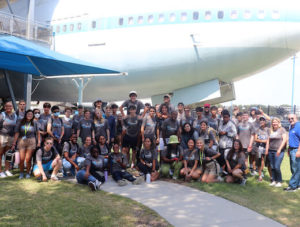 Get a peek at the inner workings of top engineering companies and centers and discover the world inside your dream career! In previous years, our students:
Get a peek at the inner workings of top engineering companies and centers and discover the world inside your dream career! In previous years, our students: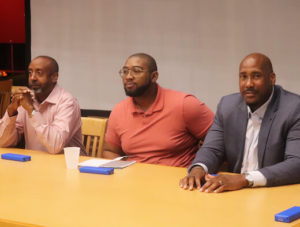 Students will gain valuable knowledge from engineering professionals on how to succeed in college and in an engineering career.
Students will gain valuable knowledge from engineering professionals on how to succeed in college and in an engineering career.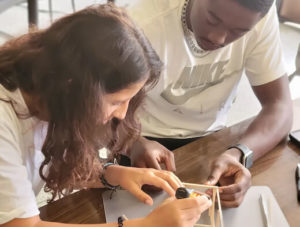 TryEngineering Summer Institute students explore engineering design challenges through hands-on teamwork. Previous students participated in projects such as:
TryEngineering Summer Institute students explore engineering design challenges through hands-on teamwork. Previous students participated in projects such as:

